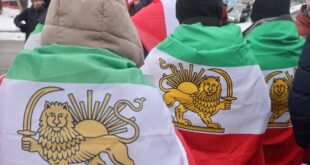 Iran warned on Sunday it would “reconsider” its cooperation with the International Atomic Energy Agency (IAEA) if the United Nations Security Council passes a fresh resolution to impose a third set of sanctions over its nuclear program.Iran agreed a timetable with the IAEA last month to answer outstanding questions over its atomic drive and activities.
Iran warned on Sunday it would “reconsider” its cooperation with the International Atomic Energy Agency (IAEA) if the United Nations Security Council passes a fresh resolution to impose a third set of sanctions over its nuclear program.Iran agreed a timetable with the IAEA last month to answer outstanding questions over its atomic drive and activities.
“We will continue our cooperation with the IAEA,” Iranian Foreign Ministry Spokesman Seyed Mohammad Ali Hosseini told reporters during his weekly press conference here on Sunday.
“But if there is a new United Nations (Security Council) resolution we will reconsider our cooperation with the IAEA and we will study different options.”
Hosseini did not specify what the options were but top nuclear negotiator Ali Larijani has already warned that any further sanctions will render Iran’s cooperation with the agency “sterile”.
The IAEA has welcomed Iran’s willingness to answer the questions on its atomic drive as “a significant step forward”.
Hosseini further described the recent report on Iran’s nuclear activities by the IAEA Director General Mohamed ElBaradei as “a further success for the country’s system of diplomacy”, and added, “This report proved the righteousness of the Islamic Republic and its stances to the world community.”
Reminding that the present trend of cooperation between Tehran and the IAEA has started due to Iran’s good intentions, he expressed the hope that the trend would be followed and completed in a desirable manner and that the country’s nuclear case would be returned from the UN Security Council to the UN nuclear watchdog agency.
Asked if Iran intends to resume voluntary implementation of the Non-Proliferation Treaty (NPT) additional protocol, Hosseini said, “As long as Iran’s nuclear dossier is not returned to the Agency, we will not adopt any voluntary measure, including implementation of the additional protocol.”
Asked about the next round of talks between Iran’s top nuclear negotiator Ali Larijani and EU foreign policy chief Javier Solana, Hosseini said the two sides would continue contacts but declined to mention the date and venue of the next meeting between the two diplomats.
Also in response to questions about the United States’ pressures on the Untied Arab Emirates to make the Persian Gulf state impose sanctions on Iranian goods and commodities, the spokesman viewed such efforts as part of Washington’s unilateral and extrajudicial policies practiced outside the framework of the United Nations resolutions.
He underlined that despite all such pressures by the US, Iran’s relations with the Persian Gulf littoral states are developing.
Regarding the issue of Iraq, the foreign ministry spokesman stressed the need for the transfer of the required authorities to the Iraqi nation and government, and said, “Iraqis can manage their country’s affairs better than the Americans.”
Elsewhere, Hosseini noted the start of a ministerial meeting of the Non-Aligned Movement (NAM) in Tehran on Monday, and said 100 delegations from the different NAM member states are due to attend the summit.
 Eurasia Press & News
Eurasia Press & News



